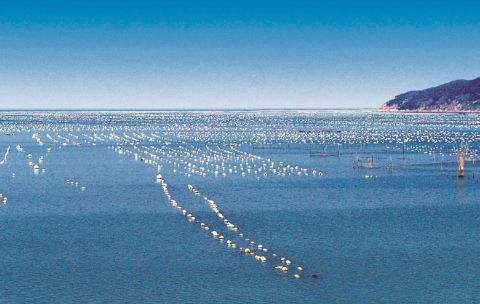(单词翻译:单击)
"Biologists," according to the New York Times, "estimate that 90 percent of lobsters are caught within a year after they reach the legal minimum size at about age six." Despite declining catches, New England fishermen continue to receive state and federal tax incentives that encourage them—in some cases all but compel them—to acquire bigger boats and to harvest the seas more intensively. Today fishermen of Massachusetts are reduced to fishing the hideous hagfish, for which there is a slight market in the Far East, but even their numbers are now falling.
据《纽约时报》说:“生物学家们估计,大龙虾大约在6岁达到法定的最小个儿以后,不出1年,90%已经被捕捞干净。尽管捕捞量日渐减少,州政府和联邦政府仍在以税收优惠政策鼓励——在有的情况下差不多是强迫——新英格兰渔民购买更大的船,更彻底地扫荡大海。今天马萨诸塞州的渔民只能捕捞丑陋的盲鳗,因为这种鱼在远东还有点市场。但是,连这种鱼的数量如今也在不断减少。
We are remarkably ignorant of the dynamics that rule life in the sea. While marine life is poorer than it ought to be in areas that have been overfished, in some naturally impoverished waters there is far more life than there ought to be. The southern oceans around Antarctica produce only about 3 percent of the world's phytoplankton—far too little, it would seem, to support a complex ecosystem, and yet it does. Crab-eater seals are not a species of animal that most of us have heard of, but they may actually be the second most numerous large species of animal on Earth, after humans. As many as fifteen million of them may live on the pack ice around Antarctica. There are also perhaps two million Weddel seals, at least half a million emperor penguins, and maybe as many as four million Adelie penguins. The food chain is thus hopelessly top heavy, but somehow it works. Remarkably no one knows how.
我们对支配海洋生命的动力简直一无所知。一方面,在捕捞过度的海域,海洋生物少于该有的数量,另一方面,在天然至贫的水域,海洋生物远远多于该有的数量。在南极洲周围的南部海洋,只出产世界上大约3%的浮游植物——少得似乎远远不足以维持一个复杂的生态系统,而它们却维持了。食蟹海豹这类动物我们大多数人也许还没有听说过,但实际上可能是地球上第二众多的大型动物,仅次于人类。多达1500万头食蟹海豹在南极洲周围的浮冰上生活。还有大约200万头韦德尔氏海豹,至少50万只皇企鹅,也许多达400万只阿德利企鹅。因此,食物链是极其不平衡的,但不知怎的却运转良好。引人注目的是,谁也搞不清这是什么原因。
All this is a very roundabout way of making the point that we know very little about Earth's biggest system. But then, as we shall see in the pages remaining to us, once you start talking about life, there is a great deal we don't know, not least how it got going in the first place.
我兜了这么个大圈子主要想说明,我们对地球上的最大体知道得少得可怜。然而,我们将在剩下的章节里看到,一旦开始讨论生命的问题,也有大量的东西我们不知道——尤其是,生命最初是怎么产生的。


